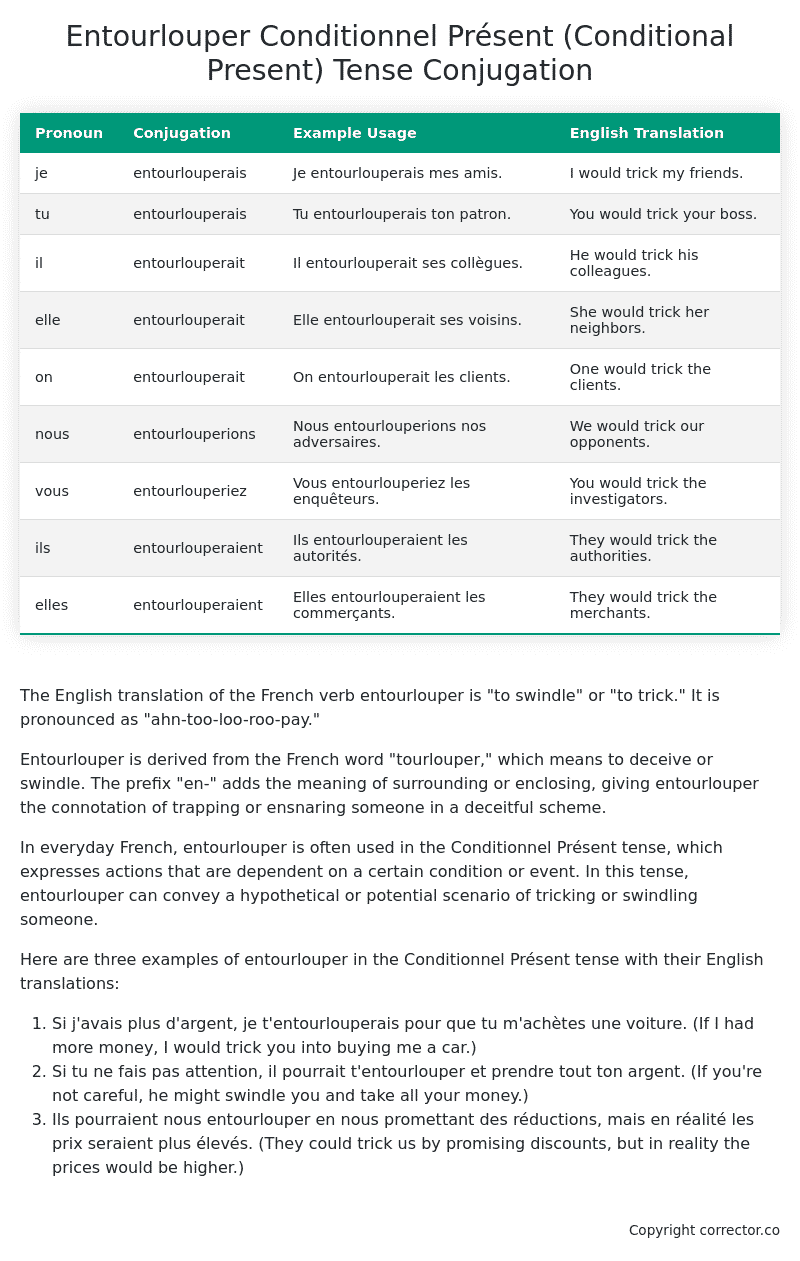Conditionnel Présent (Conditional Present) Tense Conjugation of the French Verb entourlouper
Introduction to the verb entourlouper
The English translation of the French verb entourlouper is “to swindle” or “to trick.” It is pronounced as “ahn-too-loo-roo-pay.”
Entourlouper is derived from the French word “tourlouper,” which means to deceive or swindle. The prefix “en-” adds the meaning of surrounding or enclosing, giving entourlouper the connotation of trapping or ensnaring someone in a deceitful scheme.
In everyday French, entourlouper is often used in the Conditionnel Présent tense, which expresses actions that are dependent on a certain condition or event. In this tense, entourlouper can convey a hypothetical or potential scenario of tricking or swindling someone.
Here are three examples of entourlouper in the Conditionnel Présent tense with their English translations:
- Si j’avais plus d’argent, je t’entourlouperais pour que tu m’achètes une voiture. (If I had more money, I would trick you into buying me a car.)
- Si tu ne fais pas attention, il pourrait t’entourlouper et prendre tout ton argent. (If you’re not careful, he might swindle you and take all your money.)
- Ils pourraient nous entourlouper en nous promettant des réductions, mais en réalité les prix seraient plus élevés. (They could trick us by promising discounts, but in reality the prices would be higher.)
Table of the Conditionnel Présent (Conditional Present) Tense Conjugation of entourlouper
| Pronoun | Conjugation | Example Usage | English Translation |
|---|---|---|---|
| je | entourlouperais | Je entourlouperais mes amis. | I would trick my friends. |
| tu | entourlouperais | Tu entourlouperais ton patron. | You would trick your boss. |
| il | entourlouperait | Il entourlouperait ses collègues. | He would trick his colleagues. |
| elle | entourlouperait | Elle entourlouperait ses voisins. | She would trick her neighbors. |
| on | entourlouperait | On entourlouperait les clients. | One would trick the clients. |
| nous | entourlouperions | Nous entourlouperions nos adversaires. | We would trick our opponents. |
| vous | entourlouperiez | Vous entourlouperiez les enquêteurs. | You would trick the investigators. |
| ils | entourlouperaient | Ils entourlouperaient les autorités. | They would trick the authorities. |
| elles | entourlouperaient | Elles entourlouperaient les commerçants. | They would trick the merchants. |
Other Conjugations for Entourlouper.
Le Present (Present Tense) Conjugation of the French Verb entourlouper
Imparfait (Imperfect) Tense Conjugation of the French Verb entourlouper
Passé Simple (Simple Past) Tense Conjugation of the French Verb entourlouper
Passé Composé (Present Perfect) Tense Conjugation of the French Verb entourlouper
Futur Simple (Simple Future) Tense Conjugation of the French Verb entourlouper
Futur Proche (Near Future) Tense Conjugation of the French Verb entourlouper
Plus-que-parfait (Pluperfect) Tense Conjugation of the French Verb entourlouper
Passé Antérieur (Past Anterior) Tense Conjugation of the French Verb entourlouper
Futur Antérieur (Future Anterior) Tense Conjugation of the French Verb entourlouper
Subjonctif Présent (Subjunctive Present) Tense Conjugation of the French Verb entourlouper
Subjonctif Passé (Subjunctive Past) Tense Conjugation of the French Verb entourlouper
Subjonctif Imparfait (Subjunctive Imperfect) Tense Conjugation of the French Verb entourlouper
Conditionnel Présent (Conditional Present) Tense Conjugation of the French Verb entourlouper (this article)
Conditionnel Passé (Conditional Past) Tense Conjugation of the French Verb entourlouper
L’impératif Présent (Imperative Present) Tense Conjugation of the French Verb entourlouper
L’infinitif Présent (Infinitive Present) Tense Conjugation of the French Verb entourlouper
Struggling with French verbs or the language in general? Why not use our free French Grammar Checker – no registration required!
Get a FREE Download Study Sheet of this Conjugation 🔥
Simply right click the image below, click “save image” and get your free reference for the entourlouper Conditionnel Présent tense conjugation!

Entourlouper – About the French Conditionnel Présent (Conditional Present) Tense
Formation
Common Everyday Usage Patterns
Expressing Polite Requests
Expressing Hypothetical Situations
Expressing Doubt or Uncertainty
Interactions with Other Tenses
Present Tense
Past Tense
Future Tense
Conditional Perfect
Summary
Want More?
I hope you enjoyed this article on the verb entourlouper. Still in a learning mood? Check out another TOTALLY random French verb conjugation!


